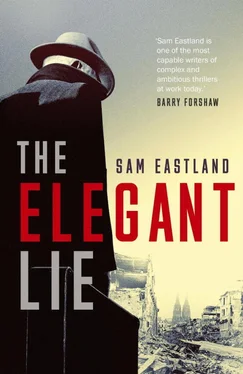‘Nonsense!’ boomed a voice.
Carter turned to see Dasch advancing upon him, his hand held out to shake. ‘You must forgive my daughter. When the Nazis were here she hated them, and when the Allies drove the Nazis out, she hated them instead. It doesn’t matter who’s in charge. Teresa will hate them all equally. In this way, she is very democratic.’
Teresa sighed and went back to her work.
‘Come,’ said Dasch, and led him into a private room at the back of the office, which was furnished with objects of such lavish quality that they appeared absurdly out of place, hemmed in by clapboard walls and sheltered from the elements by a corrugated iron roof. There was a desk, veneered in ebony and inlaid with mother of pearl, showing scenes of pagodas and sampans poled along the inky blackness by men in conical hats. The curtains were red velvet, brocaded and tasselled and held in place with bell ropes made of silk. On one wall hung a picture of a woman with almost impossibly pale skin, who was sitting in a gilded chair wearing a ruffled white dress, with her chin resting in one delicate hand and staring out across the dusty compound towards the ruins of Cologne in the distance. Who she was, and in what stately home her portrait had once hung, Dasch showed no sign of caring. Neither did he appear to have any appreciation for his desk, which was cluttered with paperwork and old, half-empty cups of coffee, whose bases had left Olympic banners of overlapping rings upon the polished ebony.
The only thing that looked like it belonged there was a large map, which spanned from Ireland in the west to St Petersburg in the east and was still window-framed with creases from the folds of its original shape.
‘Three years ago,’ said Dasch, ‘I had a map of Cologne on that wall. It seemed like the whole world to me and, in a way, that is exactly what it was. It was my dominion, so to speak. But now, as you see, I have a bigger map and, with your help, the name of Dasch will soon be known in towns I can’t even pronounce. Have you travelled much in Europe, Mr Carter?’
‘I’ve been around a bit,’ he said.
It was late October 1944 when Nathan Carter, wearing a US Army uniform and with the provisional rank of lieutenant in the Military Police Special Task Force, climbed down the metal steps of a C-47 transport plane onto the matted grass of a runway near the city of Liège in eastern Belgium. At the edges of the airstrip he could see the wreckage of Luftwaffe fighter planes◦– ME 109s and FW 90s◦– which had been damaged on landing, bulldozed to the sides and abandoned when the Germans had retreated only a few months before. Outside of newsreels back home, this was the first sign Carter had seen of the enemy and, even though these machines had been left for junk, they still looked hostile in their black and green camouflage, rippled like the patterns on a mackerel’s back.
There had been moments in that long journey, which had taken him through Gander airfield in northern Canada to Iceland, then to England and finally on to the Continent, when Carter had imagined he might visit some of the great cities◦– London, Paris, Brussels. But most of what he saw when he looked down was a shredded blanket of clouds, laid out over a pewter grey sea. And as for the great cities, he never even caught a glimpse of those.
According to the briefing Carter had received from Captain Tate on the drive to Fort Dix, his task was to investigate the theft of a US Army truck transporting more than two thousand gallons of gasoline. It had been stolen right off the streets of a village called Rocherath in the Ardennes Forest, not far from the Belgian–German border. The robbers had been civilians, all of them heavily armed. They had waited until the American driver had stepped out of the truck and gone across the road to a cafe to buy some lunch. As the thieves attempted to start the vehicle, the driver emerged from the cafe and drew a pistol from the holster at his belt. Before he could fire, he was shot dead by one of the robbers. At this point, the robbers panicked. They managed to get the truck started but one of the thieves, who was clinging to the back of the truck as it began moving, fell and hurt his leg. The other thieves either did not know what had happened or abandoned him to his fate. He was arrested by the local Belgian police and taken into custody. The gasoline had been dyed red to indicate that it was designated for military use only, which should have made it easy to trace. However, in spite of dozens of checks by military policemen at roadblocks set up all over eastern Belgium, none of the red-dyed fuel had been located. The truck had also vanished.
There had, Tate said, been countless instances of fuel going missing from US Army depots all over the world, but they were mostly small amounts, and rarely more than twenty or thirty gallons at a time. Some of this could be chalked up to poor record keeping, and some to the fact that the depots were constantly being moved around as the Allies advanced across the battlefield.
The assignment of special fuel-theft investigators had often been proposed, but no action had been taken until now, when the murder of a US Army soldier and the loss of so much fuel in a single robbery◦– not to mention the truck◦– had swept aside the bureaucratic dithering that had previously held up assignments.
Carter was under pressure to move quickly with his investigation, before such thefts emboldened other thieves and the situation got out of control.
Within minutes of leaving the plane, Carter had been bundled into a Willys jeep with MP, for Military Police, painted in large white letters on the hood, and began his journey east towards the Ardennes Forest.
The driver, who held the rank of sergeant, was a round-faced man with a Clark Gable moustache and eyes raccooned with fatigue. He wore a short canvas coat with a drab olive scarf thickly wound about his neck and a wool beanie cap pulled down over his ears. The clothing had a grimy sheen of dirt and engine grease and had moulded itself to his body, as if he had not taken it off in days or even weeks, which might well have been the truth. Even though he could not have been more than twenty-five years old, with the beanie pulled down over his ears he reminded Carter of one of the old men he used to see lined up outside a soup kitchen back in his hometown of Dunellen. The sergeant spoke so little and seemed so much a part of the machine he was driving that Carter sometimes felt as if he were being propelled across Belgium by some giant clockwork toy.
It was just as well the sergeant kept to himself, since Carter was exhausted by the trip. It was the longest journey he had ever taken and, throughout it, he had never been able to do more than doze in the freezing cargo hold of a plane over the north Atlantic or stretch out on a borrowed cot in a draughty Quonset hut, surrounded by a sea of mud next to the airfield in Keflavík, Iceland. He had struggled to keep up with the rising and setting of suns that made no sense to the workings of his mind. Eventually, his body just gave up and he lapsed into a kind of numbness, which surrounded him now in a fog, so that everything perceived by his senses seemed untrustworthy, half in and half out of a dream.
They travelled down roads lined with long ranks of beech trees, passing through slate-roofed villages with reeking mountains of manure heaped outside stone-walled barns and pastureland spreading out beyond into the rolling countryside. From men in wooden clogs and patched, faded corduroys, he caught the scent of unfamiliar cigarettes and, here and there, the iron railings of their gates had been curled back like the crooked fingers of old hags where bullets had cut through the metal. He saw houses where snipers had been routed, the windows shot away and the stonework chipped and dimpled by machine gun fire.
Читать дальше











